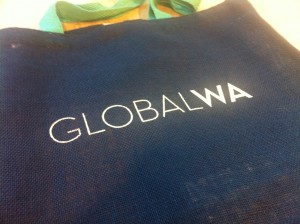On the Global Washington Conference
It’s 5:10pm, and we’re walking to the parkade beside SWING space. Piling into the car, we’re off to the border!
What happens when six GRSers are stuck in a car?
What happens when six GRSers are stuck in a car? Some rambunctious conversation! The topics range from our studies, to why we applied to the conference, our views on development experiences, the implications of voluntourism, American and Canadian politics, CETA, pipelines…you name it, I’m sure we touched on it.
Finally, after a fight with rush hour and an interesting delay at the border, we arrive in Seattle in one piece and pile into the hotel. We decide to go out and bond some more, ending up at an Irish bar. It’s almost empty on a Tuesday night, but we all hoot and holler until Alana gets on stage with the live singer to sing a duet to “Hallelujuah”! She’s so talented! Again, our conversations spin around many diverse topics in the short hour that we are there. Alex wants to go on exchange in California, Jun runs a NGO, Hayley and Alana are interested in global health and nutrition. Helen worked on a farm with 63 cows in the summer. Everyone had such amazing stories to tell! Too soon, we are returning back to the hotel for the night.

A few hours later, it’s 6am and we’re awake, already preparing for the 7:30am conference start. Right on time, we arrive at Seattle’s Bell Harbour Conference Centre. It’s so beautiful! Seattle’s waterfront reminds me a lot of Vancouver’s Coal Harbour. We arrive – finally we gain access to some caffeine. Before the keynotes begin to speak, I notice just how large the conference is. There are so many people from all different NGOs, investment companies and community organizations. I wonder where the day will take me…
———-
The day is over and I’m left in a sense of greater conflict than that of which I began. The story I draw from today is that of conflict. It began with the opening keynote, Deo Niyizonkiza. He’s from Burundi, almost a sister city to Rwanda. He speaks of how development has changed Rwanda, but Burundi is a perfect example of a place untouched by development and is falling behind. This is where his organization, Village Health Network, intervenes. He speaks of how he works with the people, asking “how can we work together to help the community to improve health?” I agree, but then I am focused on the language he uses when he says, “people come to the health centre and call it America. It’s so beautiful.” I’m unsettled. In class, we learn not to impose Westernized ideals to the local context. Is it strange that this man, from Burundi, creating sustainable changes within that community, speaks as so?
“…people come to the health centre and call it America. It’s so beautiful.”
The keynote is followed by a discussion with the CEO of Mercy Corps. He speaks about how “cash is king” and how we must “empower them to be the agents of their own recovery”. He speaks about how “we must enable them” and “we ensure there’s someone to manage projects” and figure out what is “economically measurable.” I find his answers too vague at the time. When it comes time to submit questions, I write: “who is involved in the creation of project ideas? Can you give an example?” Surprisingly, the question is picked! And his answer? He surmises that the greatest projects are those that come from the people – they are invested and have local ownership of the project in order to sustain itself. The discourse is conflicting! I end the session not knowing what my impression is.
This conflicting dialogue between “we and them” and the idea of community empowerment continue throughout the day. Some sessions were nothing short of inspiring. Partners Asia discussed that one of the key foundations and challenges of development is learning to let go of control and listen to what the locals care about. As they articulated, it’s about:
“Putting the Last First” and “Putting the First Last.”
We are always failing with development, but we must “fail forward”. We often come up short trying to truly listen and let go of control. It’s difficult and challenging – but this is the nature of development. This is in line with what I feel I’m learning. Then there is a section for two-minute pitches, where organizations basically sell their development products or projects. Again, I see conflict in my observations: there is a deep dependency between the private sector and NGOs. But as much as there is economic imperative in this sector, there is also heart.
Development can happen anywhere. In the breakout session on Global Development through sports, Seattle’s major sports team spoke of how to leverage the player’s influence to create positive changes in the community. The players were dedicated volunteers to their community, supporting large causes that are, indeed, important and most definitely influence citizens. This part was much lighter for my train of thought, though not without its qualms. It’s more in tune with where my interests lie, which is local development in urban centres. I thought it would have been interesting if they had also opened the table to talk about youth nutrition and health in Seattle, inviting both the sports teams and food/nutrition educators of Seattle.
My last session in Monitoring and Evaluation brought about conflict again. There is a huge push for non-profits to produce tangible results to show donors that their initiatives have impacts. This is an issue since it’s costly, and not all non-profits have the resources to perform them. Researcher Kentaro Toyama from UC Berkeley noted that “some evidence is better than none.” This was profound to me, as this issue seems to swarm around non-profits, putting pressure on them to produce results. To me, it seems it could lead to biased or poorly executed M&E’s, such of which I’ve observed in my FRE490 class. This was further emphasized in the closing keynote. In what the speaker called “Occupy Charity”, he noted that 1% of charities in the USA get 86% of the donations on a yearly basis.
So where does that leave me? Admist the discourse in line and unaligned to my views, I had to force myself to take a step back. Sometimes education has made me too critical of other views; perhaps it has made me ignorant. I learn that in development we should stand back and listen and be open, and yet I was not being open during some of these sessions. I caught myself several times, having to remind myself that there is no right way to development. That is a take away message. There are some basics, but everyone is still learning and everyone has something to share.
Ironically, I find that our lunchtime keynote inspired me most with his words. Ironic, because his keynote, which was less than thrilling to listen to – focused a lot on how we need to be the grassroots leaders while playing the political game. In our discussion in the car, we described this as the “superficial veil” around development. We’re dependent on economic returns, statistics, and evidence to create a marketing tool. This in turn is to convince the right people of what the “right thing” to do actually is. While in the long run, we have to keep in mind there is a heart and soul in development that we should truly remember. Those in development are likely not in it for fame or fortune. And they (and I) embody this statement:
“My life belongs to the whole community…Life is no “brief candle” to me. It is a sort of splendid torch which I have got hold of for the moment; and I want to make it burn as brightly as possible before handing it on to future generations” – George Bernard Shaw
—
7pm and we’re back on the road heading home. Laptops are out and this time we’re more comfortable, chatting away and reflecting on the day. The best part about this trip has been meeting everyone else and getting a chance to discuss things we would never normally have a chance to discuss. We’re a group of very different people, but we still found plenty in common (and not so in common) to talk about. If anything, I wish we had more opportunity to do that through GRS!

